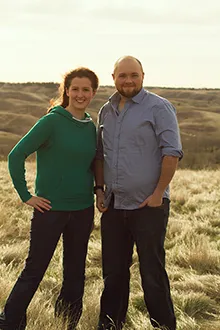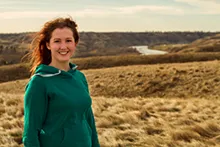AMETHYST: Remote Sensing, Right at Home

Gordon Logie and Jolene Garber might be in different programs, but their many interests collide in remote sensing. These ambitious science students are both involved in the NSERC CREATE AMETHYST program at the University of Lethbridge.
AMETHYST stands for Advance Methods, Education and Training in Hyperspectral Science and Technology. Exclusive to the U of L, AMETHYST began in May 2010 and is offered through the University’s Co-operative Education (Co-op) program for undergraduate students.
AMETHYST teaches students about working in hyperspectral science, a type of remote-imaging that uses high spectral satellite and airborne imagery to derive data. “We can get information based on how a material reflects light,” Gordon says. “It’s really an emerging science.”
“Remote-imaging has many applications,” explains Trevor Armstrong, AMETHYST program coordinator. “In geography, we can use it to determine vegetation health, in physics, they study atmospheric gases, and the health-science portion deals mainly with MRIs.”
Students can become involved in AMETHYST at the undergraduate, graduate, or PhD level. Undergraduate students are guaranteed three work terms—in a university lab, a government placement, and an industrial setting. The AMETHYST team secures all the placements and brings in experts to speak at seminars for the students.
Gordon is a fourth-year Geography student specializing in GIS (Geographic Information Systems), and Jolene is just finishing her third year majoring in Biology. Both have completed two work terms with AMETHYST and are planning to do their third term this summer.
Their first work terms were spent at the U of L working with highly respected professors and cutting-edge lab equipment. “The U of L has the only calibration lab in Canada,” says Armstrong, “and we offer some of the best opportunities for remote-sensing work in the world.”
For their second terms, Gordon worked at the Canada Centre for Remote Sensing (CCRS) in Ottawa, and Jolene was placed in Germany.

AMETHYST aims to give students practical skills with tools and also provides them with management experience, in the hopes of making them more employable. “Our goal is to develop well-rounded students, with practical experience before they enter the workforce,” says Armstrong.
Jolene says AMETHYST is perfect for students like her who have a wide array of interests. “After all, I’m a bio major who works in a physics lab!” she says, laughing. “I don’t consider taking something that doesn’t directly relate to my degree to be a waste at all. University is not just about getting a job—it’s about learning and gaining an appreciation for all fields.”
Jolene has one more year left in her undergraduate degree. No matter what she decides to do after graduation, she has AMETHYST to thank for her invaluable connections with professors and scientists, and hands-on experience working with instruments and computers.
“Technology is everywhere these days,” she says, “and I know I’ll be involved with it no matter which career direction I take.”

Apply for admission to uLethbridge today!
